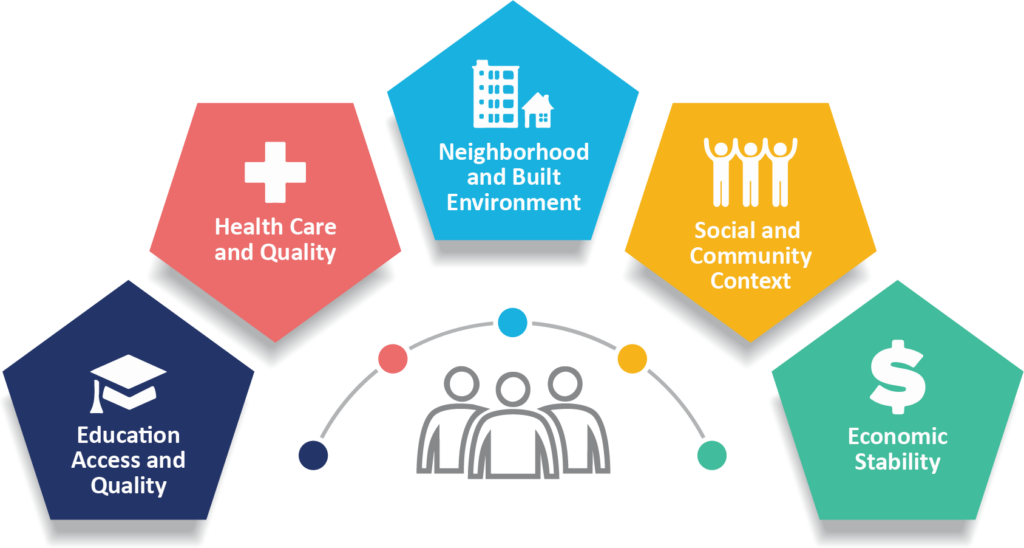
As a non-profit organization, you’re probably familiar with the concept of social determinants of health. The various elements that may have an effect on a person’s health and well-being, such as access to healthcare, education, and stable housing, are collectively referred to as social determinants of health. These factors are frequently influenced by societal problems like discrimination, poverty, and limited access to resources.
To truly and permanently improve the lives of those we serve, non-profits must recognize and address social determinants of health. After all, in order to truly create a healthier, more equitable society, we must work to address the root causes of those symptoms in addition to treating the symptoms themselves.
According to the Centers of Disease Control and Prevention, the five Social Determinants of Health are:
– Education Access and Quality
– Health Care and Quality
– Neighborhood and Built Environment
– Social and Community Context
– Economic Stability
How your nonprofit start to have an impact in this field?
Here are some suggestions to get you going:
- Choose the particular social determinants of health that apply to your business and the area you serve. Do you work in a neighborhood with a high poverty rate? Is a major obstacle to the people you serve the lack of access to education? Your ability to create specialized, successful interventions will be aided by your knowledge of the particular difficulties that your community faces.
- Join forces with other businesses and organizations to tackle these problems. Building connections with other organizations can help you increase your impact, whether it’s collaborating with a local school district to offer educational resources or a housing agency to help people find stable housing.
- Encourage policy adjustments that take social determinants of health into account. This could entail collaborating with elected officials or governmental organizations to pass legislation that expands access to resources such as healthcare and education.
- Inform the people in your community of the significance of social determinants of health and the steps they can take to advance their own and others’ health. This could entail holding workshops or offering informational materials and resources to aid in people’s understanding of the problems and their options for participation.
- Work together with other nonprofits and neighborhood organizations to develop a coordinated, all-encompassing strategy for addressing social determinants of health. Working together will enable you to more effectively and comprehensively create interventions by utilizing the assets and strengths of various organizations.
How Can Nonprofits Combat It?
So you might be wondering how HelpOpX fits into all of this at this point. Your non-profit organization can streamline its outreach, data management, and communication efforts with the aid of the community relationship management tool HelpOpX. With HelpOpX, you can quickly establish connections with other organizations in your neighborhood, keep track of the details about your volunteers and members, use our mass text message outreach tool to let people know about events and opportunities, and even poll and survey your neighbors to gather insightful feedback.
But there’s more! We will also soon be releasing a feature that will enable non-profits to connect their community members with healthcare partners and providers directly. We are eager to see the impact it will have in assisting non-profits to address the social determinants of health in their communities as it will be a game-changing addition to our already extensive toolkit.
HelpOpX is a priceless tool for nonprofit organizations seeking to increase and sustain the growth of the support they receive from their local communities. We are honored to be able to provide these incredible organizations with such a useful tool, and we look forward to continuing to work with them in the future.
Addressing social determinants of health is a difficult and important task for non-profit organizations that are dedicated to making a significant impact in the lives of their communities. Your non-profit can significantly improve the health and well-being of the people it serves by adopting a proactive, all-encompassing strategy, working in partnership with other organizations, and engaging with key stakeholders.
Having a burning question you want to ask? Ask us in our “HelpOpX: Building Stronger Nonprofits Together w/ Q&A” Nonprofit Networking Group here.
More information about HelpOpX? Visit www.helpopx.com today.
Want a shoutout of your organization? Submit info here.
